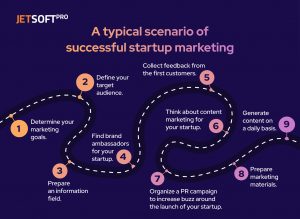According to Mayple, almost half of the startups only spend up to 2 hours on marketing per week. This is not surprising because startupers often imagine that marketing strategies are pages on social networks, landing pages with traffic from advertising, and one marketing presentation of 5 slides, which can be downloaded from the website.
Of course, marketing for startups is much more complicated.
Here’s a Typical Scenario For the Successful Marketing of a Startup:

Determine your marketing goals.
The first step to getting started with marketing is defining your ultimate goals, which should be specific, measurable, and time-bound. For example, you can specify a certain number of installations of your mobile application per quarter.
Remember to set KPIs (key performance indicators) to track your progress and measure the result.
Define your target audience.
The biggest mistake of a startup is trying to be everything to everyone. It’s like a restaurant with Italian, Japanese, Georgian, and Indian food on the menu, where one cook prepares everything. Here, the quality of dishes will definitely be worse than in specialized restaurants.

Instead, conduct market research to find the audience whose needs will be best served by what your product offers. Learn about your target buyer’s needs, their pain points, and how your startup can solve their problems.
You can also create customer profiles. To do this, find and describe a person who will use your product, including his demographics, psychographics, financial constraints, etc. For example, if your startup is a fitness app, your user can be a 22-years old girl who cares about her health and wants to look fit but does not have enough time and money to visit the gym. Her main pain is the lack of clearly organized schemes of training videos for individual needs on free resources. Therefore, she wants to find workout plans designed by professional trainers for weight loss at a minimal price.
Prepare an information field.
Create a lot of content about the problem your startup solves. These can be articles on blogs or relevant resources, such as Quora or Reddit, publications on LinkedIn or Twitter, Influencer Stories, etc.
Don’t mention your startup. You only need to generate buzz around the problem your startup can solve just before the official launch.
Find brand ambassadors for your startup.
Brand ambassadors are influencers, such as bloggers or industry experts, who have social trust and credibility and will represent your product to the people. The easiest way to find them is to research your target customers’ social media following.
Influencer marketing is a powerful tool today because, according to Shopify, 61% of Consumers Trust Influencers’ Recommendations.
Collect feedback from the first customers.
In the age of digitalization, customers are constantly looking for information about which brands they can trust before buying something. That is confirmed by recent surveys showing that 95% of consumers read online reviews before they shop.
So don’t hesitate to ask your customers to share their feedback about your product because even negative reviews can help your startup improve.
JetSoftPro Tip: Don’t try to fake reviews! Your startup’s reputation is fragile, and an exposed lie can destroy it in minutes.
Think about content marketing for your startup.
Create your website and pages on relevant social networks. Those marketing tools work around the clock to help you grow your business.
Here we have some tips for creating your website and pages on social networks:
- Don’t skimp on content; hire a professional copywriter with industry knowledge to help you create the content. Thus, your content marketing strategy will pay off over time.
- Use one domain name in all communication channels to create your unified brand identity and improve your reach.
- Improve your website’s reach with SEO (Search Engine Optimization).
- Don’t forget about Google ads or targeted promotion on social networks. This is an excellent opportunity to reach your target audience.
Organize a PR campaign to increase buzz around the launch of your startup.
This will help you increase your startup’s visibility online and offline, get featured in relevant media, and tell about the benefits of your startup to a wide range of people.
Prepare marketing materials.
Before presenting your startup to consumers or investors, you must prepare all the necessary marketing materials. These may be brochures and flyers, presentations, business cards, promotional items, such as T-Shirts, Tote Bags, or other souvenirs.
JetSoftPro Tip: Get creative with marketing materials to stand out from the competition.
Remember to generate content on a daily basis.
DOs and DON’Ts for Startup Marketing Funding
You definitely need to allocate a budget for website creation, a high-quality copywriter for your communication channels, and a designer for your marketing materials.

At the same time, avoid spending paid advertising in the first month or until you have 3-5 good reviews and a clear understanding of your target audience.
Calculation of the Startup’s Marketing Budget
Let’s say you have X amount of money to spend on marketing your startup. 80% of this amount is your initial budget, and 20% is your money for brand ambassadors and other unexpected expenses.
Ideally, your initial budget should consist of the following:
30% – for creating a website, paying to a designer, and a copywriter. Allocate a budget that will cover all these costs and provide you with the appropriate level of quality.
70% – for advertising channels. 1/5 of this amount you should allocate to testing different advertising channels to determine the cost of a lead from advertising and the conversion of a lead into a client. For the other 4/5 of this amount, you can direct the expansion of those advertising channels that gave the greatest conversion.

How Much Money Does a Startup Need for Marketing?
The amount of money needed to market your startup will depend on the competition in your niche and the country in which you will promote the startup. This means that the more competitors you have, the more money you will spend on marketing and the lower will be your costs for the preparation of the information field.
And vice versa, if you have only a few competitors, you must carefully prepare the information field, but paid advertising will be cheaper. Because rates for paid advertising on Meta, Google Ads, LinkedIn, or other social platforms are higher in developed markets and lower in less digitized markets.
Your Turn
Our team of marketing experts can help you create a marketing strategy for your startup’s needs. You can get a free consultation from JetSoftPro specialists now. Just contact us, and we will book a call.


